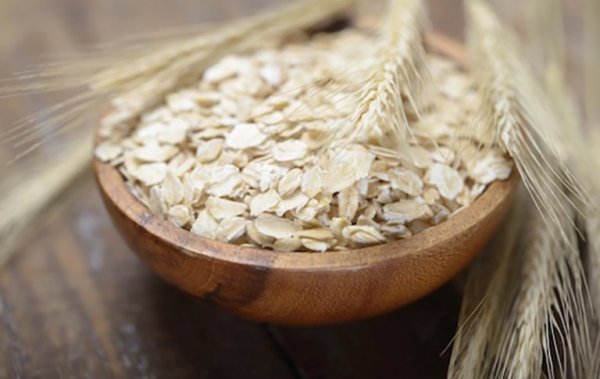6 Foods for Improving Concentration in Children

In order for the brain to function as best it can, it’s necessary to feed it the nutrients it needs. When it comes to children’s brains, food is even more important. For them, we’re not only talking about brain function but also about its development. Let’s talk about foods that can improve concentration in children with the aim of helping them reach their potential.
Lack of concentration is the result of a multitude of factors. One of them is fatigue. When someone is tired they have trouble focusing or holding their attention (concentration). Stress and lack of energy are two more elements that decisively influence a person’s ability to concentrate. There are foods that help balance the body and allow the mind to focus. Here are some of them.
Foods for improving concentration in children
Bananas
Fruit in general is highly recommended for children and people of any age. They tend to be soft, they’re not processed, and they’re low-calorie, full of fiber and water. They also come in all flavors. However, there is one that is especially complete and great as an energy source for the brain: bananas.
Bananas provide large amounts of potassium and manganese. Both elements are key for a good diet. Beyond that, research conducted by Thomas Clarkson Community College found that bananas are a great source of vitamin B6, which stimulates norepinephrine and serotonin. These two neurotransmitters are very important for concentration.
Peanut butter
In general, all nuts are great for the body. However, it has been found that peanuts, especially peanut butter, are a valuable source of vitamin E, a powerful antioxidant. (All things in moderation, though; nuts are high in calories.)
Antioxidants protect neurons and stimulate the formation of connections between them. In addition, the fat in peanuts is rich in thiamin. Thiamin is another substance that promotes central nervous system development and functioning. It also makes it easier to concentrate.
Yogurt
In general, children love yogurt. That’s good news, since it is one of the best foods for improving concentration in children. It also contributes to alertness, according to a study carried out at Cleveland Clinic.
This is because yogurt contains a high amount of tyrosine, an amino acid that helps stimulate dopamine and norepinephrine production, two crucial neurotransmitters for attention. It also contributes significantly to helping our memory function properly.

Eggs
Eggs are considered a superfood because they contain many of the nutrients we need for a good diet. One of its best properties is that it contains nine essential amino acids that help our metabolism function properly.
At the same time, eggs are rich in two nutrients that are essential for memory and concentration: lutein and choline. Plus, they’re a great source of protein and energy. Therefore, eggs are important for growth and development in children.
Oats
Oats are one of those foods that should not be missing from anyone’s diet at any age. Not only does it help us feel satisfied, but it is also a great source of energy. It is pure fiber and has high levels of potassium and zinc.
In addition to everything else, oats contain lots of vitamin E and several B vitamins. Both stimulate concentration in children. They are essential nutrients for the brain and necessary for cognitive activity.

Chocolate
Almost no child can resist chocolate. This is great, because chocolate is not only delicious, but also great as an energy boost and, of course, stimulating brain functioning.
Research by Ohio State University determined that a cup of hot chocolate a day improves blood flow in the brain. This, in turn, improves memory and concentration. Although dark and bitter chocolate is better, a touch of sweet doesn’t hurt either.
All these foods are excellent for children. The best thing is that they taste good and are good for them at the same time. Add them to your child’s diet today!
In order for the brain to function as best it can, it’s necessary to feed it the nutrients it needs. When it comes to children’s brains, food is even more important. For them, we’re not only talking about brain function but also about its development. Let’s talk about foods that can improve concentration in children with the aim of helping them reach their potential.
Lack of concentration is the result of a multitude of factors. One of them is fatigue. When someone is tired they have trouble focusing or holding their attention (concentration). Stress and lack of energy are two more elements that decisively influence a person’s ability to concentrate. There are foods that help balance the body and allow the mind to focus. Here are some of them.
Foods for improving concentration in children
Bananas
Fruit in general is highly recommended for children and people of any age. They tend to be soft, they’re not processed, and they’re low-calorie, full of fiber and water. They also come in all flavors. However, there is one that is especially complete and great as an energy source for the brain: bananas.
Bananas provide large amounts of potassium and manganese. Both elements are key for a good diet. Beyond that, research conducted by Thomas Clarkson Community College found that bananas are a great source of vitamin B6, which stimulates norepinephrine and serotonin. These two neurotransmitters are very important for concentration.
Peanut butter
In general, all nuts are great for the body. However, it has been found that peanuts, especially peanut butter, are a valuable source of vitamin E, a powerful antioxidant. (All things in moderation, though; nuts are high in calories.)
Antioxidants protect neurons and stimulate the formation of connections between them. In addition, the fat in peanuts is rich in thiamin. Thiamin is another substance that promotes central nervous system development and functioning. It also makes it easier to concentrate.
Yogurt
In general, children love yogurt. That’s good news, since it is one of the best foods for improving concentration in children. It also contributes to alertness, according to a study carried out at Cleveland Clinic.
This is because yogurt contains a high amount of tyrosine, an amino acid that helps stimulate dopamine and norepinephrine production, two crucial neurotransmitters for attention. It also contributes significantly to helping our memory function properly.

Eggs
Eggs are considered a superfood because they contain many of the nutrients we need for a good diet. One of its best properties is that it contains nine essential amino acids that help our metabolism function properly.
At the same time, eggs are rich in two nutrients that are essential for memory and concentration: lutein and choline. Plus, they’re a great source of protein and energy. Therefore, eggs are important for growth and development in children.
Oats
Oats are one of those foods that should not be missing from anyone’s diet at any age. Not only does it help us feel satisfied, but it is also a great source of energy. It is pure fiber and has high levels of potassium and zinc.
In addition to everything else, oats contain lots of vitamin E and several B vitamins. Both stimulate concentration in children. They are essential nutrients for the brain and necessary for cognitive activity.

Chocolate
Almost no child can resist chocolate. This is great, because chocolate is not only delicious, but also great as an energy boost and, of course, stimulating brain functioning.
Research by Ohio State University determined that a cup of hot chocolate a day improves blood flow in the brain. This, in turn, improves memory and concentration. Although dark and bitter chocolate is better, a touch of sweet doesn’t hurt either.
All these foods are excellent for children. The best thing is that they taste good and are good for them at the same time. Add them to your child’s diet today!
This text is provided for informational purposes only and does not replace consultation with a professional. If in doubt, consult your specialist.







